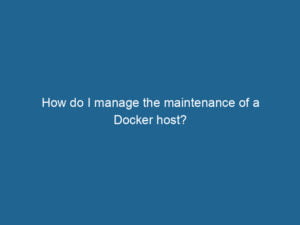Deployment and orchestrationOrchestration refers to the automated management and coordination of complex systems and services. It optimizes processes by integrating various components, ensuring efficient operation and resource utilization…. are critical components of managing containerized applications, ensuring that applications run“RUN” refers to a command in various programming languages and operating systems to execute a specified program or script. It initiates processes, providing a controlled environment for task execution…. smoothly and efficiently in production environments. Docker facilitates these processes with powerful tools and frameworks that streamline the deployment, scalingScaling refers to the process of adjusting the capacity of a system to accommodate varying loads. It can be achieved through vertical scaling, which enhances existing resources, or horizontal scaling, which adds additional resources…., and management of containers.
Deployment with Docker involves packaging an application and its dependencies into a Docker imageAn image is a visual representation of an object or scene, typically composed of pixels in digital formats. It can convey information, evoke emotions, and facilitate communication across various media…., which can be consistently deployed across various environments. This consistency reduces the risk of deployment issues and simplifies the process of moving applications from development to production. Docker containers can be deployed on any platform that supports Docker, including cloud providers like AWS, Azure, and Google Cloud, as well as on-premises servers.
Orchestration is the automated management of containerized applications, handling tasks such as deployment, scaling, and monitoring. Docker SwarmDocker Swarm is a container orchestration tool that enables the management of a cluster of Docker engines. It simplifies scaling and deployment, ensuring high availability and load balancing across services…. and KubernetesKubernetes is an open-source container orchestration platform that automates the deployment, scaling, and management of containerized applications, enhancing resource efficiency and resilience…. are the two primary orchestration tools used with Docker. Docker Swarm is Docker’s native orchestration tool, providing a simple yet powerful way to manage clusters of Docker nodes. It integrates seamlessly with Docker CLI, making it easy to set up and use.
Kubernetes, on the other hand, is a more advanced orchestration platform that offers a wide range of features for managing large-scale containerContainers are lightweight, portable units that encapsulate software and its dependencies, enabling consistent execution across different environments. They leverage OS-level virtualization for efficiency…. deployments. It provides capabilities for automatic scaling, rolling updates, and self-healing, ensuring high availability and reliability of applications. Kubernetes also supports complex networking and storage solutions, making it suitable for enterprise-level deployments.
Both Docker Swarm and Kubernetes use declarative configurations to manage the desired state of the applications. This approach allows for version-controlled, easily reproducible setups, and simplifies the process of scaling applications. For instance, you can define the desired number of replicas for a serviceService refers to the act of providing assistance or support to fulfill specific needs or requirements. In various domains, it encompasses customer service, technical support, and professional services, emphasizing efficiency and user satisfaction…., and the orchestrator will automatically ensure that this number is maintained, scaling up or down as needed.
Service discovery and load balancingLoad balancing is a critical network management technique that distributes incoming traffic across multiple servers. This ensures optimal resource utilization, minimizes response time, and enhances application availability…. are essential features provided by orchestration tools. These features ensure that traffic is evenly distributed across containers and that services can find each other without manual intervention. Docker Swarm and Kubernetes both offer robust service discovery mechanisms, making it easier to manage complex applications.
In summary, Docker’s deployment and orchestration tools enable seamless and efficient management of containerized applications. By leveraging Docker Swarm or Kubernetes, teams can automate the deployment, scaling, and monitoring processes, ensuring that applications run reliably and efficiently in production environments.



